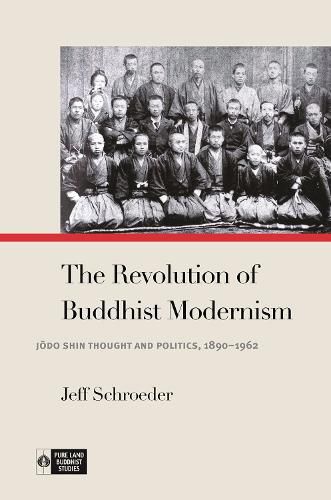Readings Newsletter
Become a Readings Member to make your shopping experience even easier.
Sign in or sign up for free!
You’re not far away from qualifying for FREE standard shipping within Australia
You’ve qualified for FREE standard shipping within Australia
The cart is loading…






Reacting to nineteenth-century forces of colonialism and globalization, Buddhist reformers across Asia strove to modernize Buddhist teachings, practices, and institutions. "Buddhist modernism" was typically characterized by disbelief in the supernatural, rejection of ritual, deinstitutionalization, and egalitarianism. The Revolution of Buddhist Modernism provides an account of the upheaval that took place within the world of Japanese Jodo Shin (True Pure Land) Buddhism when scholar-priest Kiyozawa Manshi (1863-1903) initiated modernist reforms. Kiyozawa and his disciples, especially Soga Ryojin and Kaneko Daiei, reenvisioned Pure Land teachings as a path to awakening in the present world rather than rebirth in a faraway Pure Land after death. This doctrinal reinterpretation led to a range of revolutionary institutional reforms, including new experiential methods of Buddhist studies, democratization of sect institutions, and enhanced cooperation with Japan's imperialist state.
By combining intellectual history with institutional history, The Revolution of Buddhist Modernism reveals deep connections between Buddhist thought, Buddhist institutions, and national and global politics. It tracks the chaotic, fascinating history by which modernist Buddhist ideas came to be grounded in Buddhist institutions and authoritative for Buddhist communities, offering readers a compelling, ground-level view of Buddhist modernism-and traditionalism-in action.
$9.00 standard shipping within Australia
FREE standard shipping within Australia for orders over $100.00
Express & International shipping calculated at checkout
Reacting to nineteenth-century forces of colonialism and globalization, Buddhist reformers across Asia strove to modernize Buddhist teachings, practices, and institutions. "Buddhist modernism" was typically characterized by disbelief in the supernatural, rejection of ritual, deinstitutionalization, and egalitarianism. The Revolution of Buddhist Modernism provides an account of the upheaval that took place within the world of Japanese Jodo Shin (True Pure Land) Buddhism when scholar-priest Kiyozawa Manshi (1863-1903) initiated modernist reforms. Kiyozawa and his disciples, especially Soga Ryojin and Kaneko Daiei, reenvisioned Pure Land teachings as a path to awakening in the present world rather than rebirth in a faraway Pure Land after death. This doctrinal reinterpretation led to a range of revolutionary institutional reforms, including new experiential methods of Buddhist studies, democratization of sect institutions, and enhanced cooperation with Japan's imperialist state.
By combining intellectual history with institutional history, The Revolution of Buddhist Modernism reveals deep connections between Buddhist thought, Buddhist institutions, and national and global politics. It tracks the chaotic, fascinating history by which modernist Buddhist ideas came to be grounded in Buddhist institutions and authoritative for Buddhist communities, offering readers a compelling, ground-level view of Buddhist modernism-and traditionalism-in action.